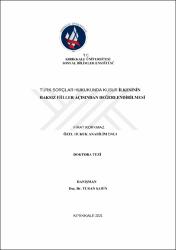| dc.contributor.advisor | TURAN ŞAHİN | |
| dc.contributor.author | FIRAT KORKMAZ | |
| dc.date.accessioned | 2022-01-20T08:55:07Z | |
| dc.date.available | 2022-01-20T08:55:07Z | |
| dc.date.issued | 2021 | en_US |
| dc.date.submitted | 2021-08-20 | |
| dc.identifier.uri | https://hdl.handle.net/20.500.12587/18085 | |
| dc.description.abstract | ÖZET Haksız fiillerden doğan borç ilişkileri TBK'da m. 49-76 arasında düzenlenmiş olup genel haksız fiil düzenlemesi olan TBK m. 49'da kusur ilkesi kabul edilmiştir. Ortaya çıkan zararın yükletilmesinde kusur ilkesi faili koruyan bir yapıdadır. Bunun temel gerekçesi de kusur ilkesinin hareket özgürlüğüne verdiği önemdir. Böylece failin kusuru olmaksızın sebep olacağı bir zarar, onun hareket özgürlüğü çerçevesinde kalmaktadır. Halbuki genel olarak başkasının hukuki alanına zarar verildiği noktada kişinin özgürlüklerinin sonlanması gerektiği herkesçe kabul edilir. Ayrıca zarar verme imkânlarına daha çok ekonomik açıdan güçlü olan kimselerin sahip olduğu da düşünüldüğünde, zararın yükletilmesi probleminde kusur ilkesinin güçlü taraf olan faili koruma meylinde olduğu görülür. Failin masum olduğu gerekçesiyle tazmin yükümlülüğü ona yüklenmemiştir. Ancak fail sadece kusur yönünden masum olup, davranış, hukuka aykırılık ve zarara sebep olma yönünden masum değildir. Ayrıca kusur, tazminin asıl konusu olan zarardan bağımsız ve genellikle zararla orantısız, tespiti zor, soyut ve hükmî bir kavramdır. Bu sebeplerle sorumluluğa sadece hareket özgürlüğü çerçevesinden yaklaşmak, sorumluluk hukukunun amaçlarına ulaşılmasına yeterli gelmez. Kusur ilkesinin ağırlıklı olarak faili korumasından ortaya çıkabilecek problemler, kusurun objektifleştirilmesi ve haksız fiilin unsurları hakkındaki farklı teorilerle kusur ilkesinin gücü azaltılarak giderilebilir. Bu yönde objektifleştirilmiş kusur teorisi kabul edilse de hukuka aykırılık unsurunun bu husustaki kullanımı, İsviçrede yaygınlaşmaya başlamakta olup henüz Türk Hukuku doktrin ve uygulamasında pek görülmemektedir. Ayrıca kusursuz sorumluluk halleri de kusur ilkesinin söz konusu yetersizliği üzerine ortaya çıkmıştır. Bu bağlamda kusursuz sorumluluk hallerinin, kusur ilkesinin hangi hukuki gerekçeler sebebiyle ne gibi yetersizliklerine ne kadar çözüm olabildiği araştırılmalıdır. Sorumluluk hukukunun dogması haline gelmiş kusur ilkesinin yeterliliği farklı açılardan değerlendirilip ortaya konulmalıdır. Anahtar Kelimeler: Kusur, Kusur İlkesi, Kusursuz Sorumluluk, Haksız Fiil | en_US |
| dc.description.abstract | ABSTRACT Obligations resulting from tortious actions has arranged between article 49-76 in Turkish Code of Obligations. General tort arrangement is article 49 and fault principle has accepted in it. Fault principle has a structure that protects the perpetrator about bearing the resulting damage. The main reason for this, is the importance that the fault principle attaches to freedom of movement. Thus, any damage perpetrator caused without his fault is in the frame of his freedom of movement. However, it is generally accepted by everyone that the liberties of the person should end at the point where the legal sphere of another person is harmed. In addition, if considering that people who are economically strong have more opportunities to cause harm, it is seen that the fault principle leans to protect the perpetrator who is the strongest part about bearing the damage problem. The compensation is not attributed to the perpetrator because he is innocent. However, the perpetrator is only innocent about fault and is not innocent about acting, unlawfulness and causing harm. Seperately, fault is an judicial concept that is independent from damage which is the main subject of compensation, and is generally disproportionate to the damage, difficult to determine, abstract and hypothetical. For these reasons, approaching responsibility only within the sphere of freedom of movement is not sufficient to reach the objectives of the law of liability. The problems that may occur from the fault principle because of the protection of the perpetrator can be overcome by decreasing power of fault principle by different theories about elements of the tort and objectiveization of the fault. Although the objectiveized fault theory is accepted in this direction but the use of the unlawfullness element in this context is becoming widespread in Switzerland and has not seen much in the Turkish Law doctrine and practice. Strict liability also emerged cause of aforementioned inadequacy of the fault principle. In this context, it should be investigated to how much strict liability be a solution with which legal justification and what kind of inadequacies of the fault principle. The adequacy of the fault principle, which has become the dogma of the law of liability, should be evaluated from different wiews. Key Words: Fault, Fault Principle, Strict Liability, Tort | en_US |
| dc.language.iso | tur | en_US |
| dc.publisher | Kırıkkale Üniversitesi / Sosyal Bilimler Enstitüsü / Özel Hukuk (Medeni Hukuk) Ana Bilim Dalı / Özel Hukuk Bilim Dalı | en_US |
| dc.rights | info:eu-repo/semantics/openAccess | en_US |
| dc.title | Türk Borçlar Hukukunda Kusur İlkesinin Haksız Fiiller Açısından Değerlendirilmesi | en_US |
| dc.title.alternative | Evaluation of The Principle of Fault in Turkish Law of Obligations in Terms of Tort | en_US |
| dc.type | doctoralThesis | en_US |
| dc.contributor.department | Kırıkkale Üniversitesi, Sosyal Bilimler Enstitüsü, Özel Hukuk Ana Bilim Dalı | en_US |
| dc.relation.publicationcategory | Tez | en_US |
















